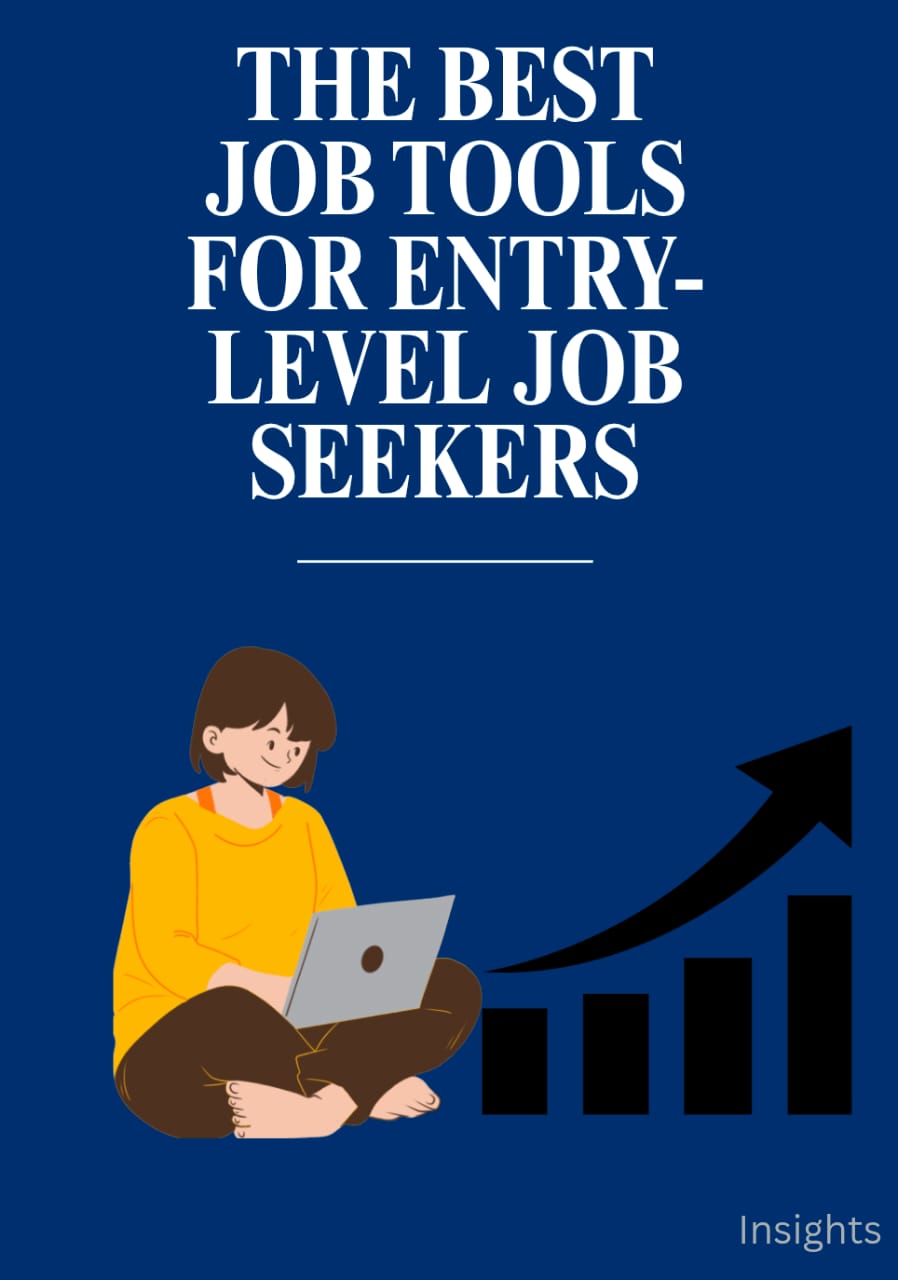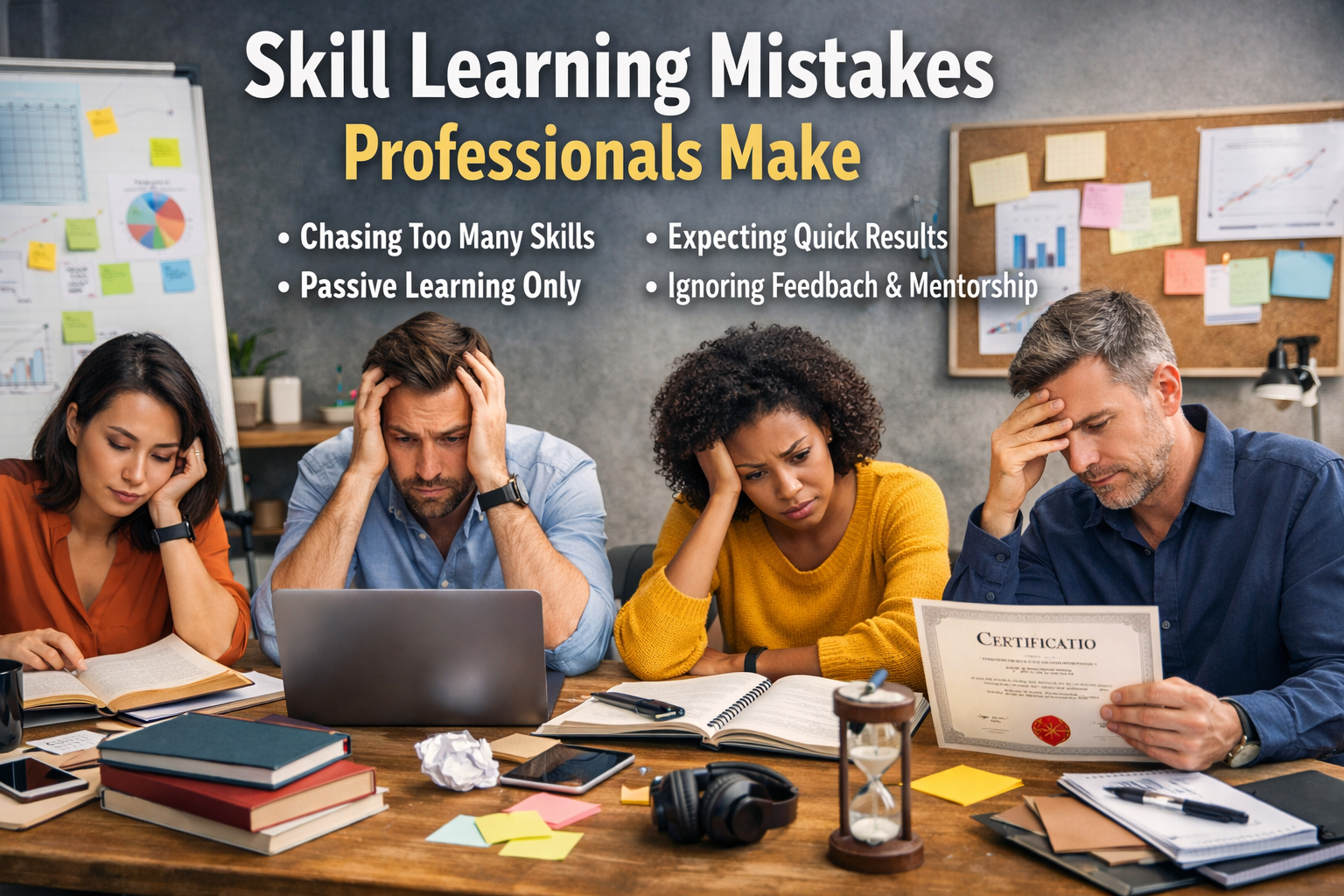Introduction
Every senior professional knows how tough it is to move from an entry-level role to a senior position—because they too once started as entry-level candidates.
The journey of a beginner is filled with challenges. They face many obstacles like repeated failures, demotivation, pressure, and complicated situations that aren’t always easy to handle. But if you want to reduce those problems and make your path easier, this article will be very helpful for you.
It shares some of the best job tools for entry-level job seekers in finding the right job. It also highlights common mistakes that you can avoid before making them, which will help protect you from feeling demotivated.
So, read this article carefully and apply the tips in your life to make your job search easier and more effective.
Challenges entry-level job seekers face
Lack of Work Experience
Many companies want experienced candidates, but they don’t have the experience, so their hiring chances are very low.
Limited Industry Knowledge
Many people get confused about what career they should choose, what role they should apply for, and which company has more growth.
Weak Resume or Portfolio
Freshers’ resume seems very simple and and they don’t even know how to create a professional and impressive resume to get shortlisted.
Tip: To create a professional and impressive resume, click here.
Difficulty Finding the Right Opportunities
There are thousands of jobs available on websites, but finding beginner-friendly jobs is not easy.
Intense Competition
Entry-level roles attract a large number of applicants, making it tough to stand out.
Poor Interview Skills
Lack of confidence or preparation in interviews can be a big hurdle. Many are not aware of common questions or how to answer them professionally.
Role of the job tools in simplifying the job search process
In today’s digital era, job searching is very different from traditional methods. Earlier, people found jobs from newspapers or from references, but everything is online now. Tools are specially designed to find jobs easily without wasting time.
Let’s see what the roles of job tools are,
Show Relevant Job Listings
Job tools suggest jobs according to your profile so that you don’t see any irrelevant postings.
Help You Build a Professional Resume
You can create your professional resume with the help of tools like Canva or NovoResume without the help of any design expert.
Optimize Your Profile for a Recruiter
Job tools give you tips to improve your online profile — whether it’s your LinkedIn headline, skills section, or summary — helping you attract more attention from recruiters.
Offer Skill Development Resources
Many tools integrate learning platforms like Coursera, Internshala Training, or Google Digital Garage, where you can build job-ready skills and earn certificates to enhance your profile.
Support Interview Preparation
With the help of the tool, you can see Interview preparation questions, and you can be well-prepared before your interview and feel confident.
Save Your Time and Effort
Instead of checking multiple websites every day, job tools use filters, job alerts, and smart suggestions to bring the right jobs directly to you — saving hours of manual searching.
What is a job tool?
You will learn about each job tool in detail, so that you can compare which job tool seems best to you and which one you want to try.
You can also try all job tools one by one and take a step forward toward your success.
So first, let’s understand what a job tool is.
A job tool is a platform, or website that connects candidates with employers.
These tools make the job search process easy and fast, providing candidates with the opportunity to apply for jobs that match their preferences.
There are many job tools for entry-level job seekers available, but not all of them are equally effective.
Even after creating a profile and providing all the necessary details, candidates receive no response and you just keep waiting while time keeps passing by.
Hope, effort, and time all get wasted.
You have to choose the best job tool for you.
Best job tools for entry-level job seekers are :
Let’s see all the best job tools for entry-level job seekers in detail;
1. Best Job Tool
It is a best job tool to find relevant jobs according to your skills and interests. It is a dynamic job search platform dedicated to connecting talented individuals with leading employers across various industries.
Key features :
- Has user-friendly interface.
- Provide comprehensive resources to help job seekers find their ideal roles.
- Offer detailed job descriptions, including responsibilities, qualifications, and requirements.
- Ensure candidates have all the information they need to make informed career decisions.
Explore top job opportunities and advance your career with Best Job Tool.
2. LinkedIn
The first one is LinkedIn. It is a professional networking platform where people create their professional profiles to showcase their skills, experience, and achievements. This is the best platform for finding professional jobs.
Key features:
- You can connect with the industry experts, recruiters, and professionals.
- You can use your LinkedIn profile as a digital resume.
- You can see all the information about the company and its job openings by following them.
- You can improve your skills through LinkedIn learning courses.
- Find full-time, part-time, remote, and freelance jobs. Set up job alerts based on your interests and location.
Pricing:-
Free Version – Create profile, connect with people, apply for jobs, post content, and limited search visibility.
Premium Career – ₹1,500–1,800/month (Best for job seekers)
Premium Business – ₹2,200–2,900/month (Best for professionals & entrepreneurs)
Sales Navigator – ₹4,000–4,500/month (For lead generation & outreach)
Recruiter Lite – ₹6,200–7,500/month (For hiring & talent search)
Best for: Job search + professional networking
3. Internshala
Internshala is a popular platform in India for students and freshers to find internships, remote jobs, and learn job-ready skills through affordable online courses.
- You can find internships as well as entry-level jobs in Internshala.
- This platform is best for those who want to start their career after college.
- You can find a job according to your interest, location, duration, or stipend.
- Internshala provides lots of remote and online internships and jobs that can be easily done from anywhere.
- Most internships do not require any prior experience. They are beginner-friendly and focus on learning by doing.
Pricing:-
Free Version: Apply to internships and fresher jobs. Use a basic resume builder. Get job alerts and take free skill quizzes
Paid Version:
Skill Courses (₹1,300–₹1,500): Short 4–8 week trainings
Placement Guarantee Courses (₹20,000–₹45,000): Includes full training, projects, job assistance, and a refund guarantee if no placement
Best for: Best for internships and fresher jobs.
4. Naukri.com
Naukri.com is India’s most popular job portal that connects job seekers with recruiters. Here, you can upload your resume, search for industry-specific jobs, and set job alerts.
- This is a popular job search tool in India.
- There are thousands of jobs available for different roles and locations.
- You can upload your resume and show it to the recruiters for free.
- You can receive relevant job alerts by setting personalized job alerts.
- Recruiters can contact you directly through your profile.
Pricing:-
Free Version – Completely free to create and maintain a profile. Browse and apply for jobs. Receive job alerts. Track your applications — no fees for applying or receiving calls from genuine recruiters
Best for: India-focused fresher job listings
5. Apna App
Apna App is a free job platform in India that helps workers find local and remote jobs quickly, with support for multiple Indian languages and direct recruiter chat.
- It’s user-friendly. You can search for jobs according to location, job category, and language. It is a perfect tool for freshers.
- The best feature of this tool is – you can directly chat with HR.
- This tool supports Hindi, Marathi, Tamil, Bengali, and many more Indian languages.
- Sometimes you don’t need to upload a resume for some job postings, you can directly apply from a basic profile and phone number.
- You can search nearby as well.
Pricing:-
Free Version- Profile creation and browsing job listings are completely free. Apply to various entry-level jobs without any cost. Direct chat with HR for many roles. Access to community groups and job alerts.
Best for: Quick applications for entry-level and local jobs.
6. Indeed
Indeed is a job search engine that collects job listings from thousands of websites, company career pages, and job boards. Here, you can upload your resume and search for jobs using filters like location, salary, and experience.
- You can find lakhs of jobs for every industry and location.
- It’s free to upload a resume and apply to jobs.
- You can find targeted jobs by applying filters like location, salary, job type, and experience.
- You can see companies’ reviews and ratings before applying for any job.
- You can receive job alerts by setting the email job alerts.
Pricing:- Completely free for job seekers.
Best for: Global job board with fresher filters
Key features entry-level job seekers should look for in job tools.
Beginner-Friendly Interface
Use only those tools that are simple and easy to use and understand.
Entry-Level Filter Option
Use those tools that have fresher, internship, and 0-1 year experience options in the filter section.
Skill-Based Job Matching
Choose those tools that suggest a job to you according to your skills and interests.
Resume Builder or Templates.
There should be an option to create a professional and significant resume automatically according to the profile.
Learning Resources
The tools should have a feature to provide free courses, and interview tips to improve.
Company Reviews & Salary Info
Check reviews and salary info to know more about the companies and roles you’re applying for.
Mobile App or Mobile-Friendly Site
The platform should work well on mobile so you can search and apply anytime.
Verified Jobs
It must protect you from scams or fake job posts — all jobs should be verified.
Job Alerts & Notifications
The tools should give regular updates and a lot of new job openings.
Internships & Freelance Gigs
Look for tools that also offer internships or freelance projects to gain experience.
Common Mistakes Job Seekers Make While Using Job Tools
Missing Alerts or Notifications
You get a job notification, but sometimes you do not check it. You should check daily or weekly according to your filters.
Applying Without Reading the Job Description
A lot of the time, candidates apply to a job after seeing the job title only; they do not read the full description of the job. For example, if there is a job update of a marketing executive, the candidate just reads the title and applies for it, but they do not see the full description of the job, which type of marketing executive the company needs, whether the company needs digital marketing or field marketing. Every candidate must read the job description before applying.
Ignoring Skill Requirements
If you are applying to those jobs where required skills are missing, then you should avoid making this mistake. You will never get any response from there because the relevant skill is missing. If you really want to apply for the job, you need to first learn the skill, and then you can apply for the job.
Missing Alerts or Notifications
Ignoring job alerts can make you minutes dailypportunities. Do not miss any job alerts, even a single job alert, because you don’t know which job will match your skills.
Updating Your Profile
An outdated profile gives a poor impression. Keep skills, education, and experience updated.
Not Using Filters Properly
You may waste time seeing irrelevant jobs if you don’t use filters like location, experience, or field.
Falling for Scams or Fake Jobs
Don’t pay money to apply. Always check for verified listings.
Tips to use job tools for entry-level job seekers effectively
Turn On Alerts & Notifications
Most job platforms send alerts based on your profile. Keep notifications ON so you don’t miss any opportunities.
Spend 10–15 minutes daily
You should spend 10 to 15 minutes daily to see all the updates, new job listings, and to apply.
Customize Your Resume Before Uploading
Don’t use the same resume for every job. Tailor it based on the job description — include relevant keywords.
Use Filters Smartly
Use filters like location, job type, salary range, experience level, etc. This saves time and shows you only relevant jobs.
Complete Your Profile 100%
Incomplete profiles look unprofessional. Add your photo, skills, education, experience, certifications, and a short summary.
Research the Company Before Applying
If a platform is asking for registration or training fees then they are Red flag. Do not get trapped in all those. Use only a verified platform and do not pay any amount of money to anyone for offering a job.
Use the ‘Save Job’ Feature
If you find a job but don’t want to apply immediately, save it. You can come back to it later without searching again.
Conclusion
I hope this article helps you in your job search and supports you in growing from an entry-level candidate to an experienced professional.
Transitioning from beginner to senior level comes with many challenges. Every step must be taken carefully, as each decision shapes your career.
The goal is to build a strong, mistake-free journey. So, avoid the common mistakes mentioned in the article, follow the given tips, and use the tools that are most suitable for your needs and job goals.
With the help of these tools, you can find the right job and steadily move forward in your career.
Once you’ve decided which tool you want to use for your job search, the next important step is creating a strong resume.
Without a good resume, getting a job is not possible—especially at the entry level, where your resume plays a big role in making a strong first impression during interviews.
This article will help you with finding the right tools for your job search, but if you also need help in building a great resume, then you must read the article recommended for resume creation.
Click here to read the article on how to create an impressive resume for entry-level jobs.
It will guide you in crafting a solid resume and help you move one step closer to landing your next opportunity quickly.
Read, Think, and Start!







Leave a Reply